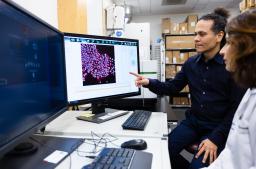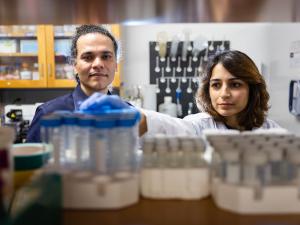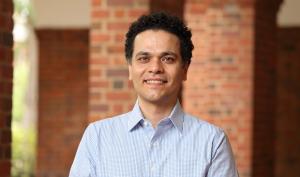Mohammad Fallahi-Sichani, Ph.D.

About
Mohammad Fallahi-Sichani is an Associate Professor of Biomedical Engineering and the Basic Science Lead of the Melanoma Translational Research Team at the UVA Comprehensive Cancer Center. His academic training includes a B.Sc. in Biotechnology from the University of Tehran and M.Sc. and Ph.D. degrees in Chemical Engineering from the University of Michigan, Ann Arbor. He completed his postdoctoral training as a Life Sciences Research Foundation (LSRF) fellow in Systems Biology at Harvard Medical School, where he also earned a Pathway to Independence Award from the National Cancer Institute (NCI). Mohammad joined the faculty at the University of Virginia in 2020.
At UVA, Dr. Fallahi-Sichani leads a systems biology research program aiming to discover the fundamental mechanisms through which human cancer cells respond heterogeneously to environmental and therapeutic perturbations. These responses can take the form of changes in gene expression, metabolic state, or cell fate decisions such as differentiation, cell division, growth arrest, or induction of cell death in response to cancer drugs. Interestingly, these responses vary among cells in different states, even those that are genetically identical. Understanding the mechanisms that underpin heterogeneous cell fate decisions and cellular plasticity has been a key challenge for quantitative biology and precision medicine. A detailed understanding of these mechanisms through the application of systems biology approaches will provide a path to identify novel therapeutic targets to: (i) maximize tumor cell killing, (ii) block aggressive tumor behaviors (such as metastatic spread), and (iii) prevent the emergence of therapy resistance in patients.
Dr. Fallahi-Sichani’s research in these areas has been funded by the National Cancer Institute (NCI), National Institute of General Medical Sciences (NIGMS), Department of Defense, as well as multiple private foundations that sponsor innovative and high-risk, high-reward research projects. His research accomplishments have been recognized by a variety of awards, including the Cell and Molecular Bioengineering (CMBE) Rising Star Award from the Biomedical Engineering Society (BMES), UVA Shannon Center Mid-Career Fellowship, Research Collaboration Award from the UVA VPR office, and a V Scholar Award from the V Foundation for Cancer Research.
Education
Postdoc Systems Biology, Harvard Medical School, 2012-17
Ph.D. Chemical Engineering, University of Michigan, 2012
M.S. Chemical Engineering, University of Michigan, 2009
B.S. & M.S. (Integrated) Biotechnology, University of Tehran, 2007
My lab develops experimental and computational systems biology tools to uncover the fundamental mechanisms through which human cancer cells respond heterogeneously to environmental and therapeutic perturbations.
Research Interests
Selected Publications
Courses Taught
Awards

UVA Research Spotlight
Research in the Fallahi-Sichani laboratory aims at designing, building and utilizing new experimental and computational tools, as means to discover fundamental mechanisms that regulate the behavior of human cells in response to perturbations, such as cytokines, environmental stress, and therapeutic drugs.


